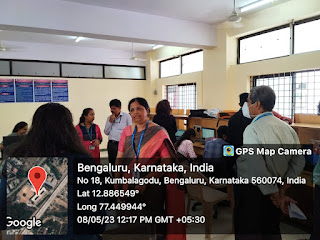The Impact of AI on Employment: Addressing Concerns and Opportunities | best engineering colleges in bangalore
The Impact
of AI on Employment: Addressing Concerns and Opportunities
In recent years, the rise of
Artificial Intelligence (AI) and automation has generated significant concerns
about job displacement and its potential to disrupt the labour market. While AI
is undoubtedly changing the employment landscape, it is essential to recognize
that its impact is nuanced, with both challenges and opportunities. This
article explores how AI is reshaping the job market, addressing the fears of
job loss while highlighting the potential benefits.
Is AI
Stealing Jobs?
Is AI stealing jobs is a never-ending debate and since its commencement, the conjectures have risen to heights. Let’s explore the reality of AI and its impact:
Automation
and Job Displacement
AI can automate tasks previously
performed by humans across various industries. Routine, repetitive jobs, such
as data entry, assembly line work, and customer service, are particularly
susceptible to automation. This has led to concerns about job displacement,
especially for workers in industries where AI can efficiently perform tasks.
The Fear
of Mass Unemployment
One common fear is that AI will
lead to mass unemployment, leaving millions without livelihoods. However,
historical precedent suggests that technological advancements often lead to job
reallocation rather than job destruction. When automation takes over routine
tasks, workers often transition into higher-skilled roles that require
creativity, problem-solving, and emotional intelligence.
The
Evolution of Jobs and the rise in the economy
AI-driven automation has already
reshaped some industries. For instance, in manufacturing, robots have taken
over many repetitive tasks, but human workers are still needed to oversee and
maintain these machines. In healthcare, AI can assist in diagnostics, but
healthcare professionals remain crucial for patient care. AI has created new
jobs in the tech sector, such as AI developers, data scientists, and machine
learning engineers. The growth of AI has led to a surge in demand for skilled
professionals who can develop, implement, and maintain AI systems.
AI has also facilitated the
growth of the gig economy, offering flexible work opportunities in areas like
ride-sharing, food delivery, and freelance work. While these jobs often lack
traditional job security, they provide income-generating options for many.
Augmentation,
Not Replacement
Many experts argue that AI
should be viewed as a tool for augmenting human capabilities rather than
replacing humans entirely. AI can assist professionals by handling repetitive
tasks, thus allowing them to focus on higher-level decision-making and
creativity. To adapt to the changing job landscape, individuals must invest in
continuous learning and development. Reskilling and upskilling programs can
help workers acquire the skills needed for AI-related jobs and remain
competitive in the job market.
Job
Quality and Work-Life Balance
AI has the potential to improve
job quality by reducing monotonous tasks, allowing workers to focus on more
engaging and fulfilling aspects of their roles. Additionally, AI can help streamline
workflows, potentially leading to improved work-life balance.
Addressing
Inequality
While AI presents opportunities
for some, it can exacerbate income inequality if not managed properly.
Policymakers and businesses must consider strategies to ensure that the
benefits of AI are distributed equitably. AI also raises ethical concerns, such
as biases in algorithms and the potential for surveillance. Addressing these
ethical issues is essential to building public trust in AI systems.
By focusing on reskilling,
upskilling, and addressing the ethical and inequality challenges, we can
harness the potential of AI to create a more dynamic and prosperous job market
for the future.
ChatGPT
And The Impact On Digital Marketing Jobs
The advent of ChatGPT and other
AI-powered conversational agents has undoubtedly had a significant impact on
the field of digital marketing. This impact, however, is not necessarily
synonymous with the displacement of jobs but rather a transformation like these
roles.
One of the primary ways AI,
including ChatGPT, has affected digital marketing is through automation. Tasks
such as data analysis, content generation, and customer interactions can be
streamlined and made more efficient with AI. For instance, AI-driven chatbots
can engage with website visitors, answer queries, and provide recommendations
24/7, enhancing customer service.
Content creation and
optimization have also seen changes. AI can assist in generating personalised
content, optimizing SEO strategies, and even predicting trends based on vast
datasets. While AI can automate some content generation, the need for creative
and strategic human input remains crucial to ensuring authentic and compelling
brand messaging.
Additionally, AI has
revolutionised data analytics. It can process and interpret vast amounts of
consumer data, providing marketers with valuable insights into consumer
behaviour, preferences, and trends. Marketers now need to be proficient in AI
tools to leverage this data effectively. Moreover, AI enables more precise
targeting of advertisements, improving ad ROI. Marketers must adapt by
acquiring skills in AI-driven ad platforms and strategies.
Rather than eliminating jobs, AI
in digital marketing has created new roles and demands for expertise in AI
technologies. Professionals with skills in AI, data analysis, and machine
learning are increasingly sought after in the digital marketing industry. They
are instrumental in developing AI-driven marketing strategies and ensuring
effective implementation.
To Sum It
Up
While AI is undoubtedly
reshaping the job market, it is not simply "stealing" jobs but
transforming them. The key lies in adaptability and embracing AI as a tool for
enhancing human capabilities. ChatGPT and AI technologies have changed the
landscape of digital marketing. While certain routine tasks may be automated,
the demand for strategic thinking, creative content creation, and AI expertise
has grown. Digital marketers who adapt and embrace AI as a valuable tool can
stay at the forefront of the industry and continue to thrive in this evolving
field.
If the field of AI and machine learning intrigues you and you wish to learn more about it visit us at Rajarajeswari College of Engineering and check the course overview.







Comments
Post a Comment